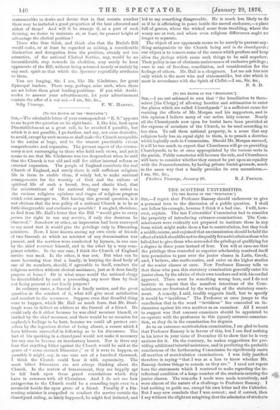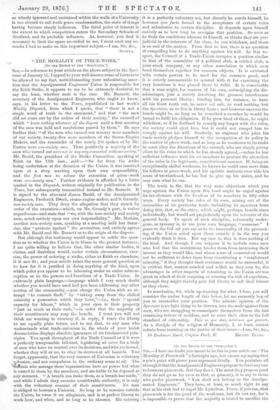THE SCOTTISH UNIVERSIIJES.
[To THE EDITOR OF THE SPECTATOR."] SIR,—I regret that Professor Ramsay should endeavour to give a personal turn to the discussion of a public question. 1 shall not follow his example, because I think it a bad one. I will, how- ever, explain. The last Universities' Commission had to consider the propriety of introducing entrance-examinations. The Com- missioners were evidently not prepared to institute these in any form which might make them a bar to matriculation, but they took a middle course, and enjoined that an examination should beheld the effect of which should.be not to disqualify for matriculationthose who failed,but to give those who succeeded the privilege of qualifying for a degree in three years instead of four. You will at once see that the privilege thus conceded to superior scholarship resolved itself into permission to pass over the junior classes in Latin, Greek, and, I believe, also mathematics, and enter on the higher studies of the senior classes at once. Now Professor Ramsay tells us that those who pass this statutory examination generally enter his junior class, by the advice of their own teachers and with his cordial approval. There must be something wrong here, and I do not hesitate to repeat that the manifest intentions of the Com- missioners are frustrated by the working of the statutory enact- ment. A remedy, I said, readily suggests itself, but to specify' it would be "invidious." The Professor at once jumps to the conclusion that in the word " invidious " lies concealed an in- sinuation against his own motives as an examiner. All I meant to suggest was that assessor. examiners should be appointed to co-operate with the professors in this (quasi) entrance-examina- tion, as they do in the examination for degrees.
As to an entrance-matriculation examination, I am glad to learn that Professor Ramsay is in favour of this, but I can find nothing in his letter in your issue of December 25 to show that he is very in:ail:Ws for it. On the contrary, he makes suggestions for pro- viding additional tutorial assistance, and in predicting the probable conclusions of the forthcoming Commission he significantly omits all mention of matriculation examinations. I was fully justified therefore in saying "that I was at a loss to know whether Mr. Ramsay desires things to remain as they are." I need not repeat here the statements which I ventured to make regarding the in- tellectual condition of a large number of the students entering the junior classes. The rem arks I made were made tentatively, and were almost of the nature of a challenge to Professor Ramsay. I had nothing to guide me, except his own letter and the Calendar. But I may now conclude that I was correct ; and if correct, then I say without the slightest misgiving that the admission of students so utterly ignorant and untrained within the walls of a University is too absurd to call forth grave condemnation, the state of things having become simply ludicrous. The third point of interest is the extent to which competition enters the Secondary Schools of Scotland, and its probable influence. As, however, you find it necessary to limit the space accorded to me, I must omit any re- marks I had to make on this important subject.—I am, Sir, &c.,
SCOTIA.







































 Previous page
Previous page